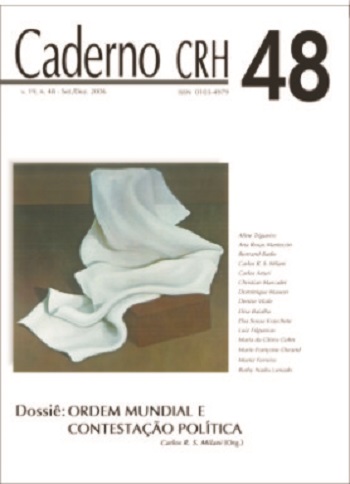ESCALA GEOGRÁFICA E TRANSNACIONALIZAÇÃO: análise sobre movimentos sociais e de mulheres
DOI:
https://doi.org/10.9771/ccrh.v19i48.18866Resumo
Se a “escala” irrompeu recentemente no vocabulário teórico dos pesquisadores de movimentos sociais e do feminismo graças às várias formas de transnacionalização dos movimentos nas duas últimas décadas, ainda há pouca relação entre esses estudos e a literatura bastante sofisticada da geografia acerca da escala e re-escalamento (rescaling). Com o amplo objetivo de demonstrar o interesse dessas contribuições da geografia no estudo da transnacionalização dos movimentos sociais e feministas, este artigo visa, em primeiro lugar, a apresentar as recentes contribuições oriundas da pesquisa geográfica sobre movimentos transnacionais e escalas e, em segundo, a delinear uma agenda de pesquisa no campo dos estudos feministas e, particularmente, dos movimentos de mulheres. A primeira parte do artigo esquematiza os principais blocos teóricos da atual corrente geográfica de estudos de escala sobre a transnacionalização da ação coletiva (espaço, escala e lugar). A segunda parte explora a pertinência da abordagem escalar, com base em pesquisas geográficas recentes, na análise de uma variedade de movimentos, redes, organizações e eventos transnacionais. O foco sobre a idéia de escala orienta a compreensão de três processos distintos da ação coletiva – organização, ação e formulação de demandas – à medida que tais processos ultrapassam as fronteiras nacionais e desenvolvem-se em detrimento do espaço. Exemplos a partir dos estudos feministas são utilizados a fim de ilustrar a relevância e o potencial desse tipo de abordagem. As implicações dessa abordagem para o estudo da transnacionalização dos movimentos de mulheres são analisadas ao longo do artigo e sintetizadas na conclusão.PALAVRAS-CHAVE: transnacionalização, ação coletiva, movimentos sociais femininos.
GEOGRAPHICAL SCALE AND TRANSNATIONALIZATION IN SOCIAL AND WOMEN’S MOVEMENTS
Dominique Masson
If “scale” has recently surfaced in the theoretical vocabulary of feminist and social movement scholars as movements have transnationalized in various ways in the last two decades, it is nonetheless with very little engagement with the existing and quite sophisticated geographical literature on scale and rescaling. Under the broad aim of highlighting the interest that a focus on geographical scale presents for studying transnationalization in social and women’s movements, this article intends, first, to present the theoretical and empirical questions and contributions arising from the recent geographical work on transnational movements and scale and, second, to lay out the research agenda this work suggests to feminists and other scholars interested more specifically in women’s movements. The first part of the article sketches the main theoretical building blocks that underlay current scalar approaches to the transnationalization of collective action in the geographical literature, namely, concepts of space, scale, and place. The second part of the paper explores the usefulness of a “scalar approach” with the help of recent geographical studies that foreground scale to inquire into a variety of transnational movements, networks, organizations and events. This exploration focuses on the ways in which thinking in terms of scale throws new light on our apprehension of three distinct processes of collective action organizing, action, and claimsmaking – as these processes get stretched beyond national boundaries and over ever wider expanses of space. Examples from selected feminist wor are used to illustrate the potential of such an approach. Implications for studying transnationalization in women’s movements are drawn out throughout the text, and synthesized in the conclusion.
KEYWORDS: transnationalization, collective action, social women’s movements, geographical, scalar approach.
ECHELLE GÉOGRAPHIQUE ET TRANSNATIONALISATION DANS LES MOUVEMENTS SOCIAUX DE FEMME
Dominique Masson
Si le terme “échelle” a surgi récemment dans le vocabulaire théorique employé par les chercheurs des mouvements sociaux et du féminisme à cause des diverses formes de transnationalisation de ces mouvements au cours des deux dernières décennies, on établit cependant peu de rapport entre ces études et les ouvrages assez sophistiqués de la géographie concernant l’échelle et le réétalonnage (rescaling). Afin de démontrer l’intérêt de ces contributions de la géographie au sein de l’étude de la transnationalisation des mouvements sociaux et féministes, cet article cherche en tout premier lieu à présenter les contributions récentes issues de la recherche géographique concernant les mouvements transnationaux et les échelles, et ensuite à définir toute une série de recherches sur le terrain des études féministes et, tout particulièrement, des mouvements de femmes. La première partie de l’article schématise les principaux blocs théoriques du courant géographique actuel concernant les études en échelle sur la transnationalisation de l’action collective (espace, échelle, lieu). La deuxième partie explore la pertinence de l’approche en échelle, en se basant sur des recherches géographiques récentes, pour l’analyse de toute une série de mouvements, réseaux, organisations et événements transnationaux. La focalisation sur l’idée d’échelle oriente la compréhension de trois processus distincts de l’action collective – organisation, action et formulation des demandes – dans la mesure où de tels processus dépassent les frontières nationales et se développent au détriment de l’espace. Des exemples pris dans les études féministes sont utilisés pour illustrer l’importance et le potentiel de ce type d’approche. Les implications d’une telle approche pour l’étude de la transnationalisation des mouvements de femmes sont analysées tout au long de cet article et synthétisés dans la conclusion.
MOTS-CLÉS: transnationalisation, action collective, mouvements sociaux féministes, géographie, approche par échelle.
Publicação Online do Caderno CRH: http://www.cadernocrh.ufba.br
Downloads
Não há dados estatísticos.
Downloads
Publicado
2007-05-10
Como Citar
Masson, D. (2007). ESCALA GEOGRÁFICA E TRANSNACIONALIZAÇÃO: análise sobre movimentos sociais e de mulheres. Caderno CRH, 19(48). https://doi.org/10.9771/ccrh.v19i48.18866
Edição
Seção
Dossiê
Licença
Todo o conteúdo da revista, exceto onde indicado de outra forma, é licenciado sob uma atribuição do tipo Creative Commons BY.
O periódico Caderno CRH on-line é aberto e gratuito.





